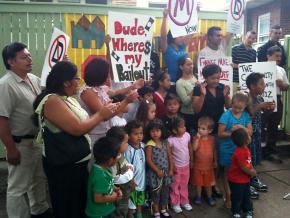Closing the door on the Ortiz family
reports on a foreclosure in Chicago--and the fight to stop it.
IN THE Chicago neighborhood of Rogers Park, Miguel Ortiz and his family have been working hard in preparation for opening a day-care center in their home. In addition to supplying free and affordable child care to low-income families in the neighborhood, and a safe space for children to go after school, this community house would bring a number of much-needed jobs to the community.
But now, a few weeks before the day-care center is slated to open, the house is being foreclosed on--by the very same financial institutions that received billions of dollars in the form of bailouts over the past two years.
Since purchasing the house two years ago, the Ortiz family has put more than $80,000 and countless hours of work into making it into a certified day-care center. They have toddler-proofed entire rooms and stairways, constructed a playground in the front yard and installed a ramp outside to make the house wheelchair-accessible.
While devoting their time and resources to bringing the house up to code, the Ortiz family was hit by the economic crisis and fell behind on mortgage payments. Last fall, Miguel reached out to the banks to get the terms of the loan modified. After eight months with no response, the Ortiz family finally received a rejection. Just three days later, they came home to find a foreclosure notice from Fannie Mae on their door.

The Ortiz family again looked for help. But when Miguel visited the Fannie Mae help center to inquire about the possibility of buying the house back, the agent laughed in his face.
Rather than help the Ortiz family to keep their house, Fannie Mae resold the property to Nationwide Advantage Mortgage at a profit. The $80,000 that the Ortiz family invested in the house was absorbed into the value of the property, and the family received no compensation for their work.
Despite these outrages, the Ortiz family refuses to back down. Earlier this month, they reached out to the community for help and got an overwhelming response. Miguel's brother Jorge told SocialistWorker.org that he was hopeful about their case. "The show of support is phenomenal," he said, "We are bringing together groups and individuals to create education and jobs, and that can be very powerful."
On August 17, the date of the Ortiz's court case, more than 60 community members came out for a rally. Among the supporters were housing activists and families from the neighborhood, many with young children who could benefit from the services that the community house hopes to provide. Because of the show of support, the judge granted the family a 30-day extension and an opportunity to build their case.
Carol Vialdores, another Rogers Park resident who won an anti-eviction case with the help of the Chicago Anti-Eviction Campaign last spring, explained why she came out to lend support. "It really touched me," she said. "Our community needs places like this. We need jobs, and we need safe places for our kids to go."
In the context of the economic crisis, with social services being slashed, resources like the community house are even more invaluable. The Ortiz family is supplying a desperately needed service to the community. A victory for the Ortiz family could mark a turning point for a renewed housing movement in Chicago.


